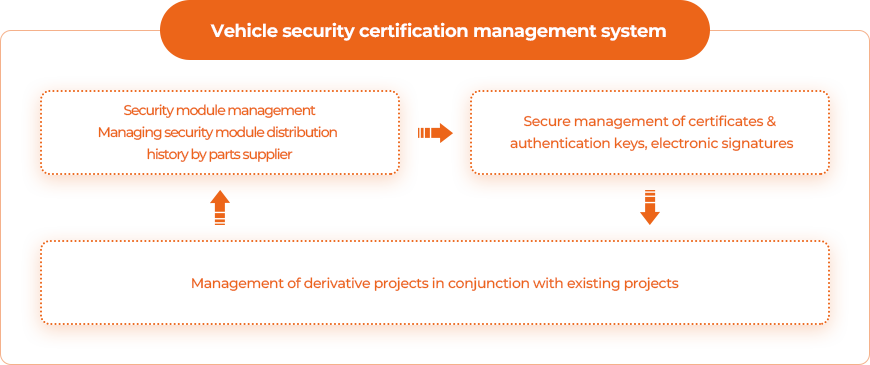According to international laws and standards related to automotive cybersecurity (e.g., European R155, Korean Motor Vehicle Management Act),
automakers(OEM) must protect their vehicles from cyberattacks. OEMs work with numerous parts suppliers and stakeholders for a single vehicle model,
and when considering follow-up models and derivative projects, the workload for regulatory compliance grows exponentially.
As a result, systematic support is crucial for effectively applying and managing cybersecurity.
for numerous vehicle models and vehicles?
-
It is difficult to manage the cybersecurity status of numerous parts suppliers one by one.
-
The process of requesting and distributing security solutions is too complicated.
-
I want to intuitively check the status of each parts supplier and project.
-
I want to directly receive firmware electronic signatures from parts suppliers without any restrictions whenever they want.
from the controller development stage.
-

- Systematic management of security module distribution
-
- Vehicle type-specific project management
- Project-specific sub-item management
- Security module distribution history management by parts supplier
- Identification of cybersecurity application status
-

- Management of certificates, authentication keys, and electronic signatures
-
- Issuing, distributing, and managing vehicle diagnostic certificates
- Creating and managing encryption keys used in encryption algorithms
- Firmware block management
- Creating firmware electronic signature verification data
-

- Effective management of derivative projects
-
- Managing follow-up/derivative projects in conjunction with existing projects
- Managing software configurations of the same controller applied to multiple vehicle models
- Calculating and tracking the impact of regulations by project and country
fully comply with international regulations, standards, and OEM requirements.
